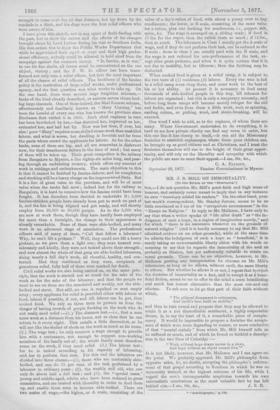MR. J. S. MILL ON IMMORTALITY.
[TO THE EDITOR OF THE SPEOTITOR.1
Sin,—I do not question Mr. Mill's good-faith and high sense of honour, and certainly never meant to imply that in any instance- he ever "knowingly misled his readers." On the other hand, your
last week's correspondent, Mr. Stanley Jevons, seems to be as little convinced as I am of his "scrupulous accurateness" in the " Essays on Religion." In reply to Mr. Malleson, I have only to.
say that when a writer speaks of "life after death" as "the in- dulgence of such a hope, in a region of imagination merely," and for which "there is no assurance whatever on the grounds of
natural religion" (and it is hardly necessary to say that Mr. Mill admitted evidence OR no other grounds), while at the same time- he admits the indulgence of such a hope as "beneficial," it is.
surely taking no unwarrantable liberty either with his words or- meaning to say that he regards the immortality of the soul as probably an illusion, but yet sufficiently valuable to retain on moral grounds. There can be no objection, however, to Mr. Malleson putting any interpretation he chooses on Mr. Mill's- utterances, as long as he allows, without cavil, the same liberty
to others. But whether he allows it or not, I repeat that to reject the doctrine of immortality as a fact, and to accept it as it bene- ficial fiction, seems to me to offer to the mind a more humiliating and much loss honest alternative than the most out-and-out atheism. To ask men to let go that part of their faith without which,
" The pillared firmament is rottenness, And earth's base built on stubble,"
and then to turn round and propose that they may be allowed to- retain it as a not discreditable sentiment, a highly respectable dream, is, to say the least of it, a remarkable piece of compla- cency. It would be impossible to propose a doctrine the accept- ance of which were more degrading to reason, or more conducive of that "mental malady" from which Mr. Mill himself tells us he suffered so much, and of which he found so faithful a descrip- tion in the two lines of Coleridge :-
" Work without hope draws nectar in a sieve,
And hope without an object cannot live."*
It is not likely, however, that Mr. IlelalIeson and I can agree on. the point. We probably approach Mr. Mill's philosophy from.
opposite sides, he, no doubt, accepting the philosopher's enforce- ment of that gospel according to Bentham in which he was so,
inexorably trained, as the highest outcome of his life, while I regard the man's unconquerable scepticism towards his own rationalistic conclusions as the most valuable fact he has left
* "Autobiography," P. 140.


































 Previous page
Previous page